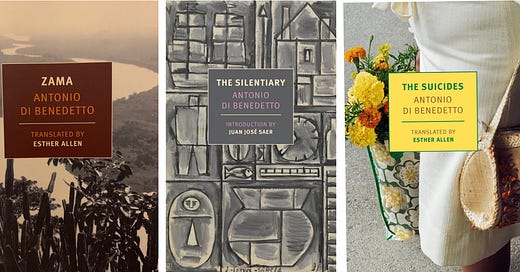Review: Àlvaro Enrigue on Antonio di Benedetto
The slim volumes that may be the greatest works of mid-century Latin American Literature
Juan José Saer said in 1973, when a large part of the fiction written by Antonio di Benedetto had already been published—and ignored—“Zama is not only superior to most of the novels written in Spanish in the last thirty years, no good Latin American novel is superior to Zama.”
The affirmation was so bold that it had the flavor of a provocation: it implied that the book of an unknown journalist from the provincial city of Mendoza, Argentina, was as important as Gabriel García Márquez’s One Hundred Years of Solitude, Juan Rulfo’s Pedro Páramo, or Mario Vargas Llosa’s Time of the Hero. Those novels, by then, had sold hundreds of thousands of copies in many languages.
It was also visionary. While the grand figures of Latin American writing in the fifties and sixties stand today in the marbled mausoleum of mandatory college reading, di Benedetto’s three short novels written in the same period—Zama (1956), The Silentiary (1964), and The Suicides (1969)—are alive, enigmatic little books. Still printed by an Argentine independent publisher, they zigzag from hand to hand among young writers all over the continent. None of these would claim to be influenced by Carlos Fuentes or Alejo Carpentier, while di Benedetto, who wrote to zero acclaim in his time, sustains his condition as a literary secret handshake. An admirer of Zama or The Suicides is a reader who can be taken seriously.
Keep reading with a 7-day free trial
Subscribe to Book Post to keep reading this post and get 7 days of free access to the full post archives.



